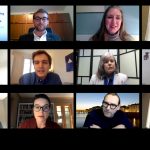

Parenting in the digital age
Policymakers perspective

#IFFDBriefing #IFFDAwards
Co-organized by UN-DESA Division for Inclusive Social Development,
the Permanent Missions of Malaysia and the State of Qatar to the UN,
with the participation of the Permanent Mission of Austria,
the Center for Educational Research and Innovation – OECD,
UNICEF Office of Research – Innocenti and Common Sense Media.
Wednesday, February 10th, 2021
10.00-11.15 am (New York Time)
Virtual Room
This year’s topic of the Commission on Social Development is very relevant for our parenting courses and for our advocacy work. More since a similar issue is highlighted for the International Day of Families observance at the UN and the impact of New Technologies is expected to be featured as one of the suggested megatrends by the United Nations during the preparations and celebration of the 30th Anniversary of the International Year of the Family in 2024.
At IFFD we are organizing various events for this purpose, including this event. Experts from our Federation, the UN System and the Academia have been focusing on how policymakers can deal with the right conditions for families to access the Internet, how telework has contributed to work-family balance, the way to improve education from the remote learning experience of COVID-19, which specific policies can help to bridge the intergenerational digital divide, what instruments should be developed to ban child abuse materials online, and what is the best tool parents can use to prevent online abuse of their children.
In our Federation, we are implementing a program to introduce technological changes in our processes to keep communication among our members and to give the new generations a relevant role in our organization.
Programme
Welcoming Remarks

Mr. Olivier Yao
World President of IFFD
Yamoussoukro, Ivory Coast
Opening Remarks

Ms. Sharifa Yousef A. S. Alnesf
Vice-Chairperson of the Bureau of the
Commission for Social Development, Qatar
Interactive Discussion
Evidence-based Policy Recommendations
on Parenting and New Technologies

Tracey Burns
Senior Analyst,
Centre for Educational Research and Innovation
OECD, Directorate for Education and Skills
Paris, France

Amina Fazlullah
Equity Policy Counsel
Common Sense Media
Washington DC, USA

Matt Brossard
Chief,
Research on Education And Development Unit
UNICEF, Office of Research – Innocenti
Florence, Italy
Documentation
- 21st Century Children (OECD)
- Emotional Well-being in the Digital Age (OECD)
- Education in the Digital Age (OECD)
- Why parenting matters for children in the 21st century (OECD)
- What it will take to permanently close the K–12 digital divide (Common Sense Media)
- Call on lawmakers to connect all students and close the digital divide (Common Sense Media)
- Wide Open School platform with free curated resources for distance learning (Common Sense Media)
- Research Papers on Education (UNICEF)
Moderator

Renata Kaczmarska
Focal Point on the Family
DISD, UN-DESA
Statements – Q & A

H.E. Alexander Marschik
Permanent Representative of Austria to the United Nations
IFFD Family Awards Ceremony
Government of the
Austrian State of
Carinthia
Reading of the Award Decision by
Nora Urrea
Vice President, IFFD

Acceptance and Words of
Appreciation by
Peter Kaiser
Governor of Carinthia
Austria
The THRIVE Model
How to cultivate character so that children can flourish online
Reading of the Award Decision by
Nora Urrea
Vice President, IFFD

Acceptance and Words of
Appreciation by
Tom Harrison
Author of the book
University of Birmingham, UK
Closing Remarks

H.E. Syed Mohamad Hasrin Aidid
Permanent Representative of Malaysia to the United Nations
Conducted by

Amanda Oliveira
Youth Advocate
Family Talks – Brazil
Background Note
The global pandemic crisis has shown the great value of new technologies, especially for families. New technologies have enabled many people to continue working at home. They have helped many teachers and parents to continue to provide an education for their children when the schools closed. They have provided ways to stay connected with friends and relatives. They have been a way to reach out for help getting food and medicines. They have been a much-needed source of entertainment.
At the same time, new technologies have shown a darker side. Parents around the world are concerned about what impact the Internet is having on their children’s lives. Their concern is not so much about if they are spending too long online but more about how their online interactions are impacting on their health, happiness and wellbeing. They also worry about them being cyber-bullied, what their kids’ digital legacy will be and if they are safe online.
The event will focus on how policymakers can help parents and families to develop character and cyber-wisdom in their children. At the same time, it will spur parents’ proactivity in seeking to cultivate values, qualities and skills in their children.
Discussion Points
1.- What is access and opportunities to digital technologies among different families? Digital opportunities and access for all (Curitiba Manifesto)
2.- How does the digital gap impact the suitability and efficiency of parenting? (Venice Declaration)
3.- How can policymakers, industry leaders and global media partners support parents in building a digital world that works better for every child, family and community? (Common Sense Media)
The IFFD Briefing has been held at the UN Headquarters in New York for the
past nine years during the Session of the Commission for Social Development.
The IFFD Family Awards are also presented during the event to the
persons or territories distinguished by the promotion of family values.
This programme is subject to change without prior notice.












